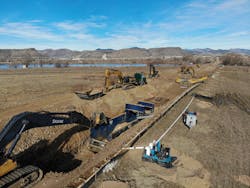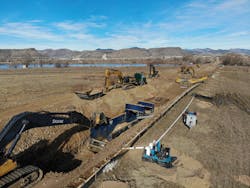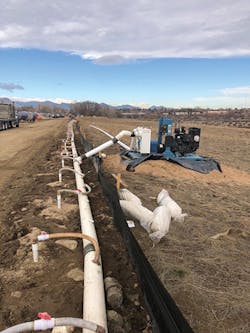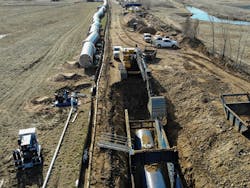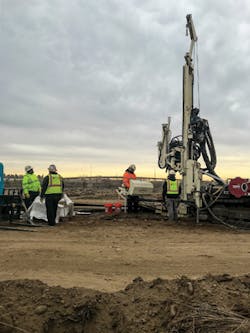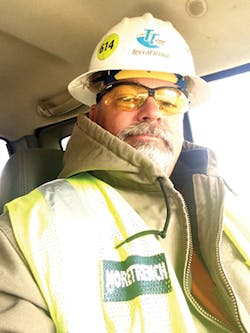Dewatering Denver Water’s Conduit 16
Using Sonic Drilling and Vacuum Wellpoints to Get Down to Bedrock
By David Giles
Denver Water’s $80 million Conduit 16 replacement is successfully underway now that TerraFirma Earth Technologies has completed vacuum wellpoint dewatering services for its portion of the replacement of the 81-year-old pipeline that runs 8.5 miles from Ralston Reservoir to the Moffat treatment plant. Reynolds Construction is the general contractor on this phase of Denver Water’s decade-long, $600-million North System renewal project.
Why Replace Conduit 16?
The Denver Water Moffat Treatment Plant began water treatment operations in 1937. Conduit 16 was completed in 1937 to convey water from the Ralston Reservoir to Moffat Treatment Plant. In 1950, Conduit 22 was added to increase the capacity of the conveyance system.
Prior to initiating the current project, Denver Water conducted a study of the existing raw water pipelines between Ralston Reservoir and the Moffat treatment plant (Dewberry, 2012). That study concluded that the two existing water conduits were approaching the end of their service life and needed to be replaced. Based on the findings of that study, Denver Water elected to replace the 42-inch-diameter Conduit No. 16 with a single new 84-inch-diameter pipeline. The alignment of the new pipeline will generally follow the existing easement for Conduits No. 16 and 22.
The plan for dewatering the cut-and-cover portion of the pipe alignment consisted of installing a vacuum wellpoint system to parallel one side of the trench excavation, with wellpoints installed every 6 feet. Photo by Josh Peltier, TerraFirma Earth Technologies.
Design of the Conduit 16 replacement occurred in two stages. In 2013 and into 2014, the design progressed to the 60 to 90 percent completion levels, assuming that the conduit would be a raw water conveyance bringing water to the Moffat Water Treatment Plant. In mid-2015, however, design was suspended while Denver Water made the decision to construct a new water treatment plant at the Ralston site, which is at the upstream end of Conduits 16 and 22.
In early 2016, design resumed under the direction that the new Conduit 16 would function as a treated water conveyance to deliver treated drinking water from the new treatment plant at Ralston to the Moffat site for storage and distribution.
“The old pipelines carried untreated water. Because the new pipeline will deliver treated water from a new treatment plant, we had to replace the old pipe. Running treated water down the old pipes would have negatively impacted the water quality,” explained Josh Kuper, project manager at Reynolds Construction. “Our section of the project consisted of five tunnel installations in addition to approximately 5,494 linear feet (lf) of 84”-diameter steel carrier pipe installed by cut-and-cover method.” The tunnels crossed Highway 93, the BNSF main line railroad track, a BNSF railroad spur track north of Highway 58, Highway 58, and I-70 and Applewood in Denver.
Detailed view of the vacuum wellpoint dewatering system components following the completion of the installation, prior to excavation.
Photo by Josh Peltier, TerraFirma Earth Technologies.
TerraFirma installed vacuum wellpoints for a large section of the shallower, open-cut portion of the project. Although this is a lesser-utilized method in the Denver area due to the higher elevation, under the right circumstances vacuum wellpoints are the best option for the area’s unique geology.
A typical wellpoint system consists of closely spaced, 1-1/2” PVC riser pipes connected to a wellpoint screen typically 3 to 5 feet in length. The wellpoints are installed to parallel an excavation, and to a depth of 25 feet or less. The risers are connected to a common header pipe, which is connected to a vacuum wellpoint pump. One wellpoint pump can operate many wellpoints installed along several hundred feet of trench.
Vacuum wellpoints function well in a wide variety of soil types, for excavations of 15 feet or less. They work best where lowering of the groundwater table to the top of a confining layer, such as bedrock, is required, as was the case for this project. The depth to subgrade for these areas varies between 10 and 15 feet below ground surface.
A “bird’s eye” view of the wellpoint dewatering and cut-and-cover excavation operations. A single 8” diesel-driven vacuum wellpoint pump was able to maintain the desired water table elevation along a 500-foot segment at any one time. Photo by Josh Peltier, TerraFirma Earth Technologies.
Denver is not familiar with vacuum wellpoints, even though this type of well is superior to sump wells in many cases for Denver’s unique soil conditions. The usual dewatering technique is to use deepwell dewatering wells, which rely on a submersible pump placed near the well bottom extending many feet below the excavation subgrade to achieve the required drawdown. However, due to Denver’s shallow bedrock, deepwell dewatering wells are not always the most cost-efficient option. As was the case for this portion of the Conduit 16 project, lowering the groundwater table to below the excavation meant dropping the groundwater table as close as possible to the confining bedrock. Deepwell dewatering wells would have had to be placed so close together that it would have been cost prohibitive. Even then, supplemental sumping within the excavation would have been required, adding more cost and further slowing down production.
Denver soils are full of cobbles and boulders — some up to 3.5 feet in diameter. “The sonic drilling method used by TerraFirma made the drilling within these difficult soil conditions much more efficient,” said Ryan Haas, Denver Water’s project manager for the Conduit 16 replacement.
TerraFirma utilized sonic drilling methods to reach bedrock approximately 12–17 feet below ground surface. The pictured rig is the Geoprobe 8150LS, operated by MW Drilling. Photo by Josh Peltier, TerraFirma Earth Technologies.
Kuper agreed that due to TerraFirma’s successful dewatering, crews were able to move forward quickly with the open-cut portion of this complex project.
Denver’s unusual geology is consistently characterized by water-bearing alluvial soils over shallow bedrock. The sonic drilling technique uses an oscillator located within the drilling head to create high-frequency, resonant energy that is directed down into the drill string and bit. That, combined with the rotational movement of the drill string and bit, causes a very thin zone directly surrounding the tooling to lose structure and become fluid to be flushed or removed from the casing. The drilling operator, in this case MW Drilling, controls the amount of vibration in the drill head to match the force needed to optimally penetrate the soil and bedrock, making it possible to efficiently drill a wide range of soil types, particularly the sand-gravel-cobble typical to Denver. The sonic drilling method is less expensive over time, and gets the job done right.
TerraFirma installed the vacuum wellpoints the proper way, and they worked perfectly for the two-month period it took to install this section of the pipeline.
The massive renewal project continues. The entire pipeline is expected to be complete by 2020, but it won’t go into service until the new Northwater Treatment Plant is operational in 2024.
Author’s Note: Denver Water does not endorse or sponsor any of the products, services, or methods identified in this article.
About the Author: David Giles is president of TerraFirma Earth Technologies, a Houston-based dewatering firm with offices in Denver. TerraFirma helps owners and contractors throughout the United States maintain acceptable groundwater levels for both temporary projects and permanent installations. Giles has 28 years of experience in groundwater control, with 20 years as a geologist for both the construction and remediation sectors. Email him at [email protected].
Circle No. 249 on Reader Service Card
